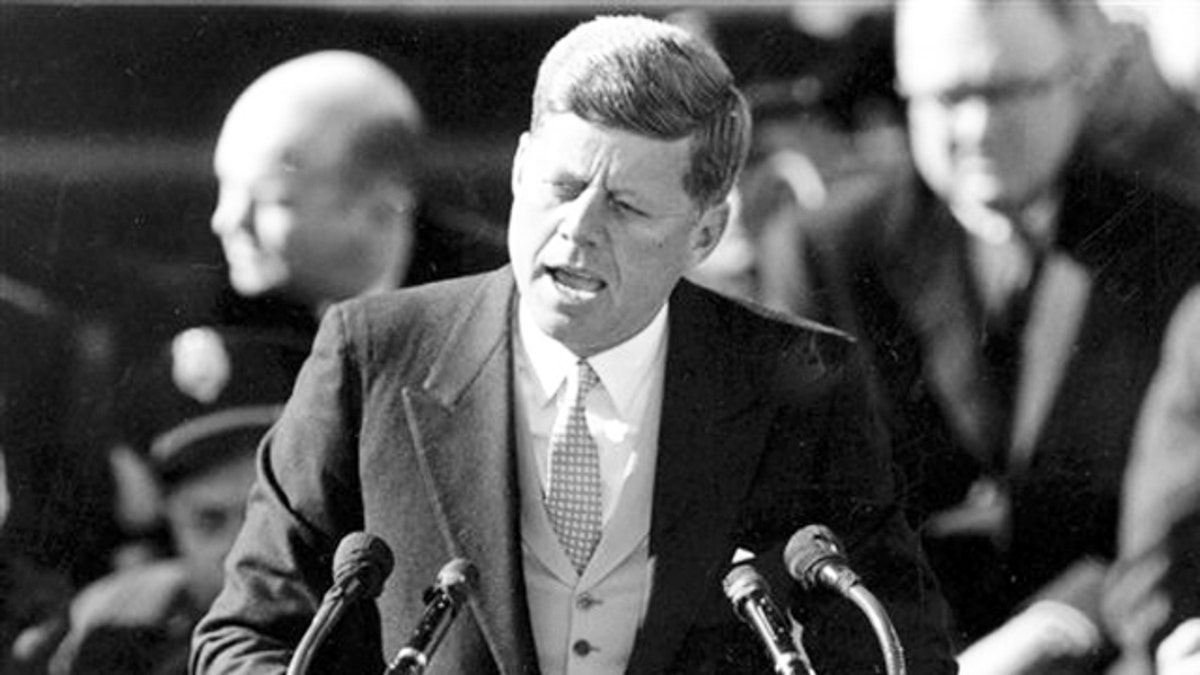Southeast
On this day in history, November 25, 1963, John F. Kennedy is buried in Arlington National Cemetery
Just a handful of days after he was assassinated in an open-car motorcade on the streets of Dallas during a campaign trip throughout Texas, President John F. Kennedy was buried at Arlington National Cemetery in Arlington, Virginia, on this day in history, Nov. 25, 1963.
President Kennedy, as well as two Kennedy infants, are today interred in Lot 45, Section 30, of Arlington National Cemetery, according to the John F. Kennedy Presidential Library and Museum.
“The permanent graves are located about 20 feet east of the site where the president was temporarily interred on 25 November 1963,” the library’s website also says.
ON THIS DAY IN HISTORY, NOVEMBER 24, THE FIRST COMMERCIALLY SUCCESSFUL BARBED WIRE IS PATENTED
“Each is marked by a simply inscribed gray slate tablet.”
The burial of the slain president, only 46 years old when he was assassinated, followed a somber and nationally televised funeral process.
Then-Sen. John F. Kennedy, the 1960 Democratic presidential nominee, is shown thanking the Democratic National Convention for selecting him here, on July 13 in Los Angeles. Kennedy won the nomination with a first-ballot victory that pitted him against then-Vice President Richard M. Nixon in the November 1960 election. (Getty)
JFK had not specified where he wanted to be buried, according to History.com.
“Most of his family and friends assumed he would have chosen a plot in his home state of Massachusetts,” the site also notes.
JFK “qualified for a plot at Arlington National Cemetery, but he also deserved a special site befitting his presidential status.”
As a veteran of World War II, he “qualified for a plot at Arlington National Cemetery, but he also deserved a special site befitting his presidential status.”
ON THIS DAY IN HISTORY, NOVEMBER 22, 1963, JOHN F. KENNEDY, 35TH PRESIDENT, IS ASSASSINATED
The spring before he died, President Kennedy “made an unscheduled tour of Arlington and … remarked to a friend on the view of the Potomac from the Custis-Lee Mansion, reportedly saying it was ‘so magnificent I could stay forever,’” the same site points out.

On Jan. 20, 1961, President John F. Kennedy addressed the nation in his Inaugural Address: “And so my fellow Americans, ask not what your country can do for you; ask what you can do for your country.” (AP1961)
After Kennedy was killed on Nov. 22, 1963, the friend who accompanied JFK to Arlington that day “relayed the comment to the president’s brother-in-law, Sargent Shriver, who suggested the site to Jacqueline Kennedy, the president’s widow,” History.com also reports.
“Jackie, who was responsible for the final decision, toured the site on November 24 and agreed. ‘He belongs to the people,’ she said,” the site also notes.
Jackie Kennedy “lit the first eternal flame and, a few days later, the grave site was enclosed with a white picket fence.”
The then-first lady also reportedly asked if workers at the cemetery could erect “some sort of eternal flame at the grave site,” says History.com.
President John F. Kennedy while posing for a picture at his desk with a U.S. flag in the background. (Alfred Eisenstaedt/Pix Inc./The LIFE Picture Collection via Getty Images)
“Cemetery officials scrambled to put together a makeshift Hawaiian torch under a wire dome, covered by dirt and evergreen boughs. The flame was fed by copper tubing from a propane tank situated 300 feet away.”
Then, after the graveside military ceremony on November 25, Jackie Kennedy “lit the first eternal flame and, a few days later, the grave site was enclosed with a white picket fence.”
The eternal flame now “burns from the center of a 5-foot circular flat granite stone located at the head of the president’s grave.”
The next month, in December 1963, “Jackie Kennedy returned to the grave and was photographed kneeling in prayer among a sea of wreaths and bouquets left by recent visitors.”
The eternal flame today “burns from the center of a 5-foot circular flat granite stone located at the head of the president’s grave,” the JFK Library site notes.
“The burner, a specially designed apparatus, which was created by the Institute of Gas Technology of Chicago, consists of a nozzle and electric ignition system.”
The John F. Kennedy Eternal Flame burns at the grave site of former President John F. Kennedy and his wife, Jacqueline Kennedy Onassis, at Arlington National Cemetery in Virginia, near Washington, D.C. (Robert Alexander/Getty Images)
The library also notes, “A constantly flashing electric spark near the tip of the nozzle relights the gas if the flame is extinguished by rain, wind or accidents. The fuel is natural gas mixed with proper quantities of air to control the color and shape of the flame.”
The library says as well, “The entire site, with a total area of about 3.2 acres, was set aside by the Secretary of the Army with the approval of the Secretary of Defense to honor the memory of the president.”
People can be seen in the background visiting the Eternal Flame at the grave of former President John F. Kennedy near the 100th anniversary of his birth at Arlington National Cemetery on May 26, 2017, in Arlington, Virginia. (BRENDAN SMIALOWSKI/AFP via Getty Images)
It also says, “The land has been retained for the nation as a whole and has not been deeded to the Kennedy family.”
“The area now is appropriately landscaped with new plantings mingled among some of the historic trees.”
“While magnolias predominate, there are crab apple, willow oak, hawthorn, yellow wood, American holly and cherry trees interspersed among flowering plants and shrubs.”
More than three million people visit Arlington National Cemetery each year.
For more Lifestyle articles, visit www.foxnews.com/lifestyle.
Read the full article from Here